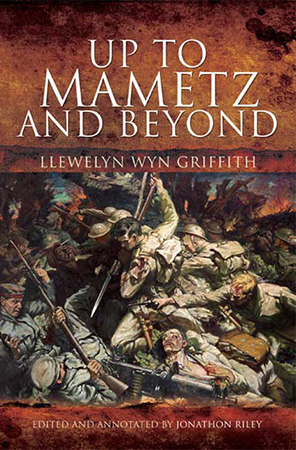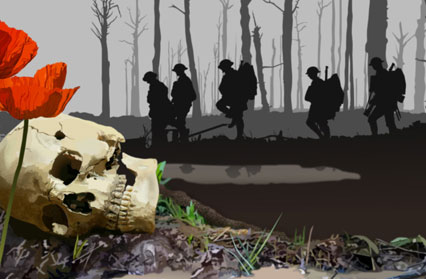Pen and Sword Books, 2010, 193 pp.
 ‘Writing now, on the last day of 1957, I cannot hope to be able to recreate on paper the life that I led during the rest of the war.’ The line opens the fifty-eight pages that comprise chapters nine to twelve, entitled Beyond Mametz, of this expanded re-issue of Llewelyn Wyn Griffith’s first war memoir of 1931. The added material, explains Jonathon Riley in his meticulous notes, is the draft for a sequel to Up to Mametz, that Wyn Griffith himself never saw published.
‘Writing now, on the last day of 1957, I cannot hope to be able to recreate on paper the life that I led during the rest of the war.’ The line opens the fifty-eight pages that comprise chapters nine to twelve, entitled Beyond Mametz, of this expanded re-issue of Llewelyn Wyn Griffith’s first war memoir of 1931. The added material, explains Jonathon Riley in his meticulous notes, is the draft for a sequel to Up to Mametz, that Wyn Griffith himself never saw published.
The author declares his stance: ‘the temporary soldier forced into daily contact with it all.’ Beyond Mametz sees him through from July 1916 to the Armistice. His total service in the army comes to four and a half years, three as an infantry officer, then company commander and a general staff officer. The prose is blunt. A new Brigadier is termed ‘a strange specimen…a stupid man, far and away the most stupid man I ever met: lazy, greedy, a bore in the mess.’ He has ‘a prima donna for a General and a disgruntled chief of staff’ with the result that ‘everybody was jumpy, for the corps commander sacked people right and left as the fancy took him.’
The author finds inner solace in the writing of letters and poems to the woman at home. She, characteristically in Great War Britain, has been taken in as a draughtsman at Cammell Laird’s Birkenhead shipyard. The latter part of the war Wyn Griffith calls ‘the stagnant condition of our war-making’, albeit with its short moments of release. A chance movement in the summer of 1918 brings him to a château near Rheims. Its owner is Moet and Chandon and, at two francs a bottle, ‘for the next three weeks we had nothing to drink bit champagne.’
He leaves uniform in February 1919 ‘lucky enough to escape being wounded or sick’. Back in a London hotel he immediately succumbs to the devastating post-war flu epidemic. Jonathon Riley for his notes has researched the symptoms, the death rate- around twenty percent- and its tally of anywhere between fifty and one hundred million worldwide. Wyn Griffith was, he says, indeed lucky to have survived this second time.
Wyn Griffith’s working life was spent in the civil service-he was in the team that created the PAYE system- but he has gifts that would have befitted a writer’s career. Of the officer class he writes ‘we were tenants of an estate of mud.’ From the vantage point of nearly forty years on, and a life of stability and domestic happiness, he writes that ‘the elements of fear, of real and imagined danger, of discomfort and deprivation, of filth and of repulsiveness, of anger and hate, of contempt for the ignorance above which insisted on the continuance of Passchendaele have lost their strength.’ But the balm of time’s passing has not taken away ‘the memory of men who can no longer speak.’
Beyond Mametz completes the chronicle of the first book and Pen and Sword Books have produced a worthy new edition. A short foreword captures the view of the author through the eye of a grandson. The young officer has become the retiree who can crack the crossword in The Times in thirty minutes, a broadcaster, Captain of Wales’ team for the Round Britain Quiz, an enjoyer of Brahms, Wagner and a glass of Guinness.
The publishers provide nine maps, from a survey view of northern France to the campaign movements at the Somme, the third battle of Ypres and the German offensive of March and April 1918. A number of drawings by David Jones are included, from soldiers sleeping, to the wrecked church at Elverdinghe, a captured German machine gun and a pair of dead trench rats. The twenty-six photographs include Germans and New Zealanders, French and British, generals and privates. A full-page picture shows the wasteland of a battlefield near Soissons in 1918. ‘By Western Front standards’ writes the Editor ‘the terrain is relatively unscarred.’
Jonathan Riley’s elegant introduction is written from the perspective of a distinguished and decorated soldier. He traces the author’s life succinctly: birth in Llandrillo, schooling in Blaenau Ffestiniog and Dolgellau, employment with the Inland Revenue, until 4th August 1914, when, aged twenty-four, he is like much of Britain on holiday. Keen to enlist he is prevented by his job being given protected occupation status. With a change in criteria his application for a commission is accepted in January 1915.
Riley as a professional is familiar with army structure and describes the 38th (Welsh) Division and its breakdown into brigades and battalions. He sketches the Allied strategy formulated at a conference at Chantilly in December 1915. The German attack and sustained battle at Verdun alter the thrust of the Somme campaign. In the offensive around Montauban and the capture of Mametz in July Riley describes the scene that ensued in detail. Mametz wood is tangled in undergrowth and the debris of centuries. The four thousand casualties include the death Wyn Griffiths’ nineteen-year-old brother Watcyn.
A war memoir is firstly military history, but it succeeds in literary terms for reasons that surpass the purely military record. Up to Mametz in its slim eight chapters soars on three counts. The first is the quality of Wyn Griffiths’ prose. Inner musings he calls ‘clammy companions on a dark night in a strange place: reason could not drive them away, but fatigue triumphed over all in the end and bought sleep.’
He comes to Richebourg St Vaast, now reduced to ‘an empty shell of a village’ its church ‘little more than a grey scree of stone.’ He describes a small redoubt: ‘a dug-out in this sector was not a hole in the ground. It was a child’s clumsy effort to build a little one-roomed house, with sandbags full of viscous mud for bricks. It had no foundation, no frame, no structure.’
Secondly, there is the documentary aspect with the detail that only a participant can furnish. The food is repetitive- one of the technologies that made feasible the years of trench warfare was the canning of food. To add cheer to the ‘same acid tea, a tin of milk, slabs of close-knitted bread, and a tin of nondescript jam’ he describes the making of a steam pudding without any of the proper ingredients being available. Standard issue biscuits are pounded down to make a flour base.
The arrival of troops from Ireland ‘greatly enriched my life and enlarged my vocabulary; their oaths and cursings were romantic imaginings after the banalities and repetition of our English swearing.’ Tunnelling has now been made familiar through Birdsong. Wyn Griffith captures all the tension, each side listening via geophones- ‘a kind of stethoscope’- to the slightest sound from the other. The effects of exhaustion give small mercy in rest. Grabbing a two-hour sleep on a plank he writes that ‘on such a bed flesh was no protection to the bones; it was a small envelope containing a jumble of crossing nerves, warring with themselves and raised to a state of red-hot sensitivity.’
The First World War has its uniquely brutal arithmetic of attrition that Wyn Griffith knows well. The life of an infantry office ‘worked out to a mathematical average of a few weeks… I had seen many men come and go.’ The best memoirs make their impact in going beyond their particular place and time. In his final chapter ‘The Gleaning’ Wyn Griffith looks back at the assault on Mametz Wood. ‘The long-stretched agony of the week had scoured something out of every man in the column.’ He sees soldiers’ eyes which are ‘dull and slow-moving, coated with a film that turned their opacity into a revelation of all the anguish that lay behind them.’ He captures in words all that the camera of Don McCullin did in the terrible faces of veterans of a later war.
Certain truths that Wyn Griffith observes endure. He meditates on the melancholy caused by the sight of homes, once lived-in and now smashed and abandoned. In Mametz Wood itself a powerful passage describes a psychological state whereby the senses, overwhelmed by the noise and the piled-up corpses all around, put their owner into a realm of dissociation. ‘A swirl of mist within me had thrown a curtain to conceal the chasm of fear, and I walked on unheeding and unexpectant’ is how this remarkable passage comes to its close.
Memory from the First World War has now gone in the way that the shadow of experience is now receding from the Second World War. Neighbours among whom I grew up, normal family men, had been captured at Dunkirk, embarked on bombing raids, been sunk mid-Atlantic. A quiet man had been on the last ship to escape safely from Croatia. Wyn Griffith writes ‘there were two kinds of men in the world-those who had been in the trenches, and the rest.’ It was true, and true too for those who fight in our wars. The word ‘trenches’ might easily be taken out and ‘Fallujah’ or ‘Helmand’ put in their place.
original illustration by Dean Lewis











